Interview With Melissa Ostrom
Melissa Ostrom. She’s an artist—on the page, in the pottery studio, in her garden, and in her kitchen. She loves to create beautiful things that nurture. I am a huge fan of her work. I’ve read her two published novels and much of her shorter fiction; I’ve ordered her lovely pots as gifts for myself, friends, and family; I look forward to the pictures she posts of her garden and her early morning walks with her Cavalier King Charles Spaniel Mocha. And while I have yet to taste one of the luscious desserts she also posts pictures of on Twitter, I look forward to the day that I will. Melissa is a thoughtful, kind, and generous woman with many talents she graciously shares with others. It was my pleasure to speak with her this fall on Zoom and to introduce her to you today!
If you like Melissa’s pottery (and I’m sure you will!) and would like to order a piece or several this holiday season, please contact her here.
And while you’re at her website, be sure to check out her blog! It’s wonderful!
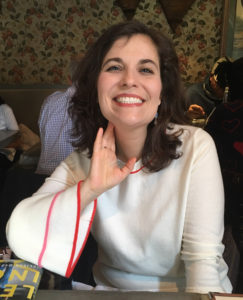 Diane: Hi, Melissa. Welcome! I’m so excited to speak to you today.
Diane: Hi, Melissa. Welcome! I’m so excited to speak to you today.
Melissa: Thanks for having me.
Diane: My pleasure. I just want to start out by saying that we met on Twitter, and that’s been so wonderful. You are quite the Twitter person—you have got that Twitter thing down.
When people take a look at your Twitter posts, they get a sense of your generosity. There’s so much to read out there, and I look to you as my curator. You pick wonderful pieces to share and provide the links. It’s such a gift. You really embody literary citizenship.
Melissa: I appreciate that. I feel really grateful for the community on Twitter. Where I live, I just don’t have that network. I never have, and I never got an MFA. So it’s not like I have these daily interactions with other writers outside of the Twittersphere. It’s been a nice way to connect with writers.
If somebody likes one of my previous posts, I’ll try to stop by and see what they’re doing. If I see that they have a story out or a poem, I’ll read and share it. I feel bad, because I know there are people I’m not getting to, but there’s only so much time.
Diane: That’s very true. So, you live in western New York. I’m guessing pretty rural?
Melissa: Yes. This is Lake Ontario fruit country.
Diane: Your books are set in the same area?
Melissa: Yes, they are.
Diane: Tell me about western New York and you. Did you grow up there?
“I Took a Job in the Country So I Could Live There”
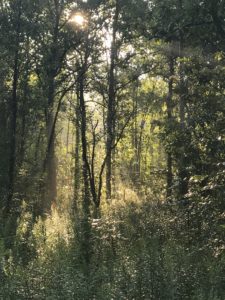 Melissa: I grew up in southwestern New York in the Jamestown area, Chautauqua County. That’s a few hours away. I came here about 23, 24 years ago for a job. I was offered a secondary English teaching position at Kendall High School, just the town over from where I live now. I thought, “Sure, I’ll take the job,” and I never left. I love this area and loved teaching high school English, too—did that for 11 years. It was a wonderful experience. But when I was pregnant with my first child, I decided I didn’t want to teach quite so much.
Melissa: I grew up in southwestern New York in the Jamestown area, Chautauqua County. That’s a few hours away. I came here about 23, 24 years ago for a job. I was offered a secondary English teaching position at Kendall High School, just the town over from where I live now. I thought, “Sure, I’ll take the job,” and I never left. I love this area and loved teaching high school English, too—did that for 11 years. It was a wonderful experience. But when I was pregnant with my first child, I decided I didn’t want to teach quite so much.
Teaching English is a very rewarding profession, but it’s intense and time consuming. You want your students to be good writers, so you have to assign them writing, and you need to give them feedback. I was already teaching part-time at the community college and kept that job after I quit my full-time position. I had saved a lot when I was teaching—like a little squirrel—so it wasn’t like we were completely without that income.
Pottery sales helped, too, and I started writing more when I didn’t have to teach so much. That was nice.
Diane: How does your natural surrounding inform your writing?
Melissa: A lot. I was born in Carlisle, Pennsylvania and lived there for the first years of my life before we moved to Jamestown. That was very rural. I missed the country when we lived in Jamestown. When I got the teaching job, I rented half of an old Victorian house on 70 acres of cherry orchards. I remember my colleagues saying, “Don’t you want to get an apartment out in Rochester and commute?” Rochester is fairly close, and most of the teachers did that. I was like, “No, I took a job in the country so I could live there.”
I feel so lucky to live in this beautiful place, with the lake and the orchard, so it probably does come through in my writing.
Diane: It does. It’s magical, a magical thread in your work.
Melissa: Aww, thank you.
Diane: Let’s jump into your writing life. When did you start?
“I Hate to Say That Some of Our Pieces Just Might Not Be Good, But That Could Be the Case, Too”
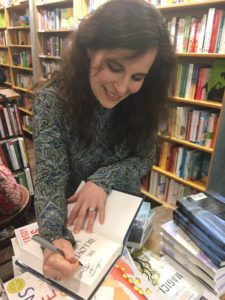 Melissa: Well, I became interested in writing early on. I was in the writing club in high school and an English major in college. My first degree is in English lit, but I did a concentration in creative writing. At that point, I was very much into poetry writing. I got to study with Ruth Stone, who was such an amazing teacher. It was just sheer luck that I picked Binghamton University, and she happened to be there. I really loved her as a professor, but I never quite understood what a big deal it was to get to study with her, not until I was older. Her poetry is so wonderful.
Melissa: Well, I became interested in writing early on. I was in the writing club in high school and an English major in college. My first degree is in English lit, but I did a concentration in creative writing. At that point, I was very much into poetry writing. I got to study with Ruth Stone, who was such an amazing teacher. It was just sheer luck that I picked Binghamton University, and she happened to be there. I really loved her as a professor, but I never quite understood what a big deal it was to get to study with her, not until I was older. Her poetry is so wonderful.
I went to the Bread Loaf School of English at Middlebury for grad school, because they have a summer program that’s really nice for teachers. I got my MA in literature and was able to take some creative writing classes and study with Paul Muldoon, another great poet. I didn’t get into fiction writing until after my 11 years of teaching at Kendall High School and after my daughter was born. I guess I felt like trying something new.
Both of my kids, from infancy, were like my husband in that they tended to stay up late. This worked out really well for me, because I’m a morning person. I go to bed before everyone, and they’re still sleeping in the morning when I get up, so I have a few hours to myself, a wonderful, quiet time.
When I started writing prose, I didn’t know what I was doing, so I read a lot of books on writing. As a teacher of teenagers, I felt confident with that audience, so I wrote a series of YA novels—four books. After I was done with those, I thought, “Maybe I should try to query these.” So I read a book on querying agents.
I queried the first book of the series and got a couple of manuscript requests, but ultimately no one was interested in taking that on. I thought, “Oh, maybe I’m just not there yet.” I don’t think I was. That’s something I’m still learning now. When you have a story that you keep on sending out and it doesn’t find a home, a lot of writers will say, “Turn right around and send it to someone else.” But more and more I’m like, “Well, maybe this piece isn’t there yet. Maybe it’s not ready.” I hate to say that some of our pieces just might not be good, but that could be the case, too.
After writing that series, I wrote another novel, a work of contemporary women’s fiction, and went through the same experience of querying agents, getting a few manuscript requests, but not finding an agent. So I set that one aside and wrote another novel. Went through the same experience of querying.
“It’s Odd to Think of Any Part of New York As the Wild West, But This Really Was Considered the Wild West in the Early 1800s.”
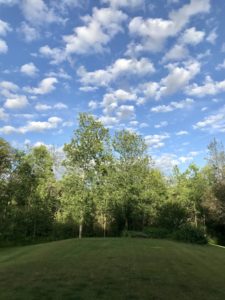 Diane: What was going on in your head and your heart when you weren’t getting any bites. It’s not a small thing to write a novel.
Diane: What was going on in your head and your heart when you weren’t getting any bites. It’s not a small thing to write a novel.
Melissa: It was a little heartbreaking. I can remember talking to my brother, who’s a poet. He said, “Maybe you should try to get some short fiction publications under your belt, and then go back to these novels.” I think one of his concerns was that I really didn’t have anything to put in my query letters, like an MFA or previous publications. I think he also, without coming right out and saying it, felt that maybe writing short stories would be a good way for me to hone my craft. That certainly proved true. So I did that, and I got some publications under my belt.
Then I wrote The Beloved Wild and started the querying process, but at that point, I had built up a shell and didn’t have high hopes for it. It was just such an odd experience. I had three agents who expressed keen interest, and finding representation happened very, very quickly.
Diane: Tell us a bit about The Beloved Wild.
Melissa: Well, it’s historical. The area where I live now is the Genesee Valley, which saw the first wave of westward expansion from New Englanders. It’s odd to think of New York, any part of New York, as the wild west, but this really was considered the wild west in the early 1800s. That fascinated me. Also, this area has a lot of historical charm. 80% of the cobblestone buildings in the country are in this area. I don’t know if you’ve ever seen cobblestone houses, but they’re very beautiful. And the Erie Canal goes through here as well.
So, a lot of things got me thinking about the history of this area. Then one time I was taking a walk closer to the lake down on Woodchuck Alley. There’s a little graveyard there. I remember poking around and looking at gravestones, and I saw something very interesting I couldn’t quite figure out. There was a gravestone of one gentleman among gravestones of women who shared his last name. It struck me when I saw the dates, the days that they had died, that he probably had a few different wives because they died in childbirth.
I started doing some research. We don’t pay enough attention to the fact that women frequently died in childbirth. How odd that would be to go into marriage and know that you were entering something that could cost you your life. I connected to this in a personal way because I have a bicormuate uterus and had to give birth to my kids via Cesarean deliveries.
My doctor made it very clear that “If this were 100 years ago, either you or the infant would have died.” I think that that’s always stuck with me. That I would have been one of those women.
“One Thing I Hope Shines in My Stories, Is the Importance of Friendship and Community”
Diane:That’s fascinating.
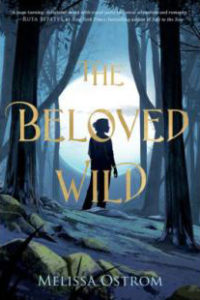 Melissa: Yeah, it is fascinating to me, too. In The Beloved Wild, Harriett Winter’s birth mother died giving birth to her. Harriet has a very close relationship with the mother she’s always known, the woman her father marries after her birth mother dies. But she is conscious of her birth mother’s fate. She senses there is a risk to a woman’s future, and that there’s no option outside of that risk. Even if you decide to not get married, you’ll be ostracized by the community because that was just not what you were supposed to want.
Melissa: Yeah, it is fascinating to me, too. In The Beloved Wild, Harriett Winter’s birth mother died giving birth to her. Harriet has a very close relationship with the mother she’s always known, the woman her father marries after her birth mother dies. But she is conscious of her birth mother’s fate. She senses there is a risk to a woman’s future, and that there’s no option outside of that risk. Even if you decide to not get married, you’ll be ostracized by the community because that was just not what you were supposed to want.
Diane: In both The Beloved Wild and Unleaving and a lot of your short pieces, too, you have strong, young women characters. I love Harriet, the young protagonist in The Beloved Wild. She is quite a trailblazer, both literally and figuratively. Your characters, they’re tough but they’re also vulnerable, a wonderful mix. You explore female friendship and mother-daughter relationships. You also have kind and supportive male characters who make themselves vulnerable. I think all those combinations are quite unusual.
Melissa: I really appreciate that.
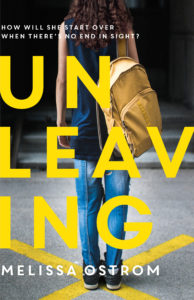 One thing I hope shines in my stories, is the importance of friendship and community. I really value my friends, and I feel lucky to have strong relationships. I’m not a very competitive person, and I don’t like when I see women pitted against each other. I don’t believe that that’s how we need to be.
One thing I hope shines in my stories, is the importance of friendship and community. I really value my friends, and I feel lucky to have strong relationships. I’m not a very competitive person, and I don’t like when I see women pitted against each other. I don’t believe that that’s how we need to be.
Diane: That definitely shows. Your books, though, are not without conflict between women. I’m thinking of Unleaving and the relationship between the Maggie’s mother and sister, and how they work things out, and how your characters experience such wonderful growth.
I’m also curious about your flash fiction writing. “Red,” which was just nominated for Best of the Net and selected to be included in this year’s Best Small Fictions and Best Microfiction anthologies is a new take on Little Red Riding Hood. How did you get interested in reimagining fairytales?
“So Often Those Original Fairytales Are Problematic”
Melissa: I have been interested in reimagining fairytales since high school. I really like the idea of taking something that’s part of our schemas. We know this story. So especially in the context of flash, it does a lot of the work for you, because that’s already there. You get to play with something without inventing the initial material. So often those original fairytales are problematic and you get to play with that, as well, rewrite them in a way that suggests how they’re problematic. The lesson in “Red” is don’t walk places alone, especially places that aren’t heavily trafficked by other people, because you could get raped or attacked, this sense that as a woman, you’re vulnerable if you’re by yourself, and also the suggestion that men are unable to check their baser instincts.
Diane: Like it’s your fault for putting yourself in that position, if something bad happens to you, right?
Melissa: Yeah, I think you see that a lot in fairytales. So it’s fun to revisit that and think about it.
Diane: You’ve won a lot of awards and accolades for your work. You’ve had-
Melissa: Not a lot.
Diane: You have! And having two books published is a huge accomplishment. How has that changed your life?
Melissa: Well, I have to say the excitement of getting that first contract, and getting the agent and the publisher, all of that is something that I will cherish. I remember my first agent, who’s also a wonderful writer, a Newbery Award-winning writer. She said something I thought was very interesting, and it certainly proved to be true in my experience: “People talk about the calm before the storm, before your books come out. Well, there’s a calm after the storm. You think it’s going to change your life a lot more than it does.” It’s a wonderful thing to have those books out there, but it’s a very competitive industry. There are so many people who put books out, that you really can have difficulty getting that spotlight. I don’t even know that you want to have the spotlight except you need it if you want to sell more books in the future.
Diane, I’m just going to be honest with you, I don’t think I’m very good at that spotlight stuff.
“I Like Making Things, Whether It’s Stories or Pots or Pies”
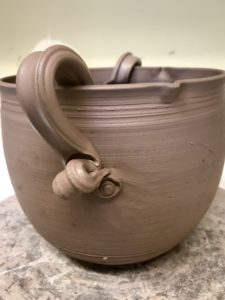 Diane: You’re expected to do everything and be good at everything, right? Selling yourself, your books, your work. It’s really a lot.
Diane: You’re expected to do everything and be good at everything, right? Selling yourself, your books, your work. It’s really a lot.
Melissa: It’s a lot, and I don’t really know what the answer is, because I do think it’s wonderful that so many people are published, sometimes by self-publishing. I think it’s wonderful we can get our books out there and share them, but I think, realistically, there are only so many readers. If you or I were to ask a student, “Do you consider yourself a reader?” They might say, “Oh yes, I love to read,” and then you ask them, “How many books do you think on average you read a year?” They might say, “Five books.” That, to them, constitutes being a good reader. I don’t think it’s the way it used to be pre-gadgetry. We have so many other forms of entertainment now.
Diane: That’s right.
Melissa: The reading audience has shrunk, and I don’t know if it’s big enough for the number of books that come out every year.
Diane: It’s true. It will be interesting to see what happens with the industry as we move forward for sure. Let’s talk about your pots. Your amazing pots.
You can just tell they’re made with love. How did you get into that?
Melissa: When I was an undergrad, I saw someone do a demonstration on the wheel in an art class. I thought it was beautiful to watch. I wanted to learn how to make pottery because of that. I think I like making things, whether it’s stories or pots or pies. I just like to make things.
Diane: Oh right. Your pies. I see pictures of those too!
Melissa: I also like to eat a lot.
“I Always Knew That Having My Own Little Pottery Space Was Important to Me”
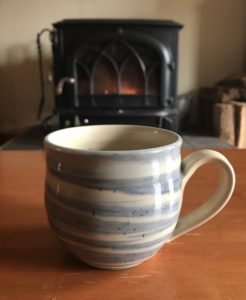 Diane: I hear you. You have your own studio in the house or…
Diane: I hear you. You have your own studio in the house or…
Melissa: It’s in my garage. I call it my studio, but really it’s nothing fancy. I saved up for it when I was still a full-time teacher. I always knew that having my own little pottery space was important to me, but it’s an expensive hobby. I had to save for the kiln and the wheel. My goal is always to sell enough pottery to put me in a position where I can afford to continue to make pots.
Pottery is so wonderful and relaxing and creative but in a way that’s different from writing because it’s language-less. It’s almost thoughtless. I love it. I started in college and always managed to find places to throw pots as I was working thorough my undergraduate and graduate years. Then I was lucky because at Kendal High School, where I taught, they had a kiln and a few wheels. They didn’t have anyone who knew how to do pottery, so I offered to teach adult ed classes. That also gave me access to the kiln for my own pots.
But there is something about having your own place to make things. This morning, I did a little writing, and then around 6:00, I went out to my studio and-
Diane: Wait a second. You did writing first, and then at 6:00 a.m. you went to your studio?
Melissa: Diane, I go to bed really early. I am like a baby. Yeah, so there’s something about the rain outside and throwing in my studio. It’s a very cozy place.
Diane: Do you do it every day?
Melissa: I pretty much do pottery every day.
Diane: And writing?
Melissa: And writing, I probably do that daily, or revising. You know how it is.
Diane: That’s writing.
Melissa: I’ll count that as writing, too.
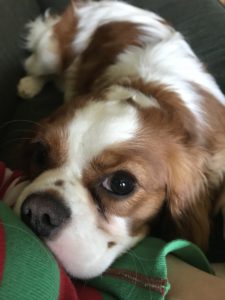 Diane: In one of your blog posts, you talked about pottery as centering. I can see that for sure. Working with your hands. You garden, you make pies, all work with your hands.
Diane: In one of your blog posts, you talked about pottery as centering. I can see that for sure. Working with your hands. You garden, you make pies, all work with your hands.
There’s something about that that is very grounding, I think.
Melissa: And very healthy.
Diane: And then, there’s Mocha.
We can’t do an interview and not talk about Mocha.
Melissa: She’s right at my feet. She’s taking her morning nap.
“Writing a novel is like that cross-country running experience. There are things to muddle through, but it’s not as exhausting as the short form, in terms of starting and finishing, starting and finishing”
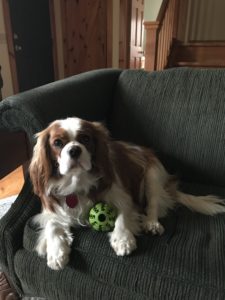 Diane: How old is she?
Diane: How old is she?
Melissa: She’s two. We got her from my friend Liz. When one of her dogs had a litter of puppies, we went over to see them. Then the kids of course were, “Oh, please, please, please.” At that point, I was like, “Oh, I’m just not sure.”
Diane: Wait a second. You brought your kids to see puppies—that’s kind of a setup.
Melissa: I know. It really was. We ended up with Mocha. She’s the best family dog. Such a lover.
Diane: What are you working on now, Melissa?
Melissa: A little of this and that. Like you, Diane, I really like these short pieces because you can start them and finish them quickly. And it’s certainly easier to publish short stories than novels. But I am also writing a novel. I always marvel at writers who only write short stories and flashes, because it’s almost like being a sprinter, right?
As I’m sure you know with writing your novel, when you feel, “Okay, I’m in the story now,” it’s like the door has opened, and now you’re in this world. It’s nice to live there for a while, and you don’t have to constantly be coming up with a new idea. You just have to figure out how to further the plot. Writing a novel is like that cross-country running experience. There are things to muddle through, but it’s not as exhausting as the short form, in terms of starting and finishing, starting and finishing.
My novel is in the beginning stages, and I’m hesitant to say anything about it because, to be honest, I don’t quite feel like the door has opened for me yet. I’m only 5, 6,000 words into it. The last two pieces I was working on, what I thought were going to be long pieces, they turned out to be false starts. I just wasn’t feeling the character. Maybe you’ve had this experience, too. With longer pieces, at a certain point, you have to know that you have enough fuel to reach the end of the journey. But with my previous two projects, it’s almost like I was constantly sensing that I was close to empty. So we’ll see.
But I’m hopeful with this one. It’s a work geared toward middle grade readers, a younger audience than that of my last two novels.
Diane: So, Melissa, this has been wonderful! I loved talking with you and finally hearing your voice. And I look forward to reading whatever you put out into the world next. Thank you so much for doing this!
Melissa: Thank you for inviting me to take part in your interview series, Diane!
As always, I’d love to hear your thoughts. Please leave a comment or send an email!
See you in Deember!
XOXO
Diane

If You Know Another Amazing Woman (Or Person Of Any Gender!) Who Might Like To Join Us At WomanPause, Please Forward This Link: WomanPause



Talk about “You had me at ‘Hello'” WOW!! I love this woman from the first sentence! I adore this website! It gives me hope and serenity in our united desire to bring beauty into the world!! Thank you, dear Diane! Thank you, Melissa!!
And thank you, dear Janet! There is power in numbers! Yay for that “united desire to bring beauty to the world!” I know you do your part!
Love this!!! and Love my Niece Melissa…so proud of you…and I love my mug!!!
Thank you, Debi for writing in! And you are in good company! Your niece (and her mugs) are loved by many!
What a wonderful interview. Well done, both of you! I love hearing more about Melissa, such a talented artist and just a lovely human being–always so supporting of the writing community.
Thank you, Rebecca! I always love learning more about Melissa! Speaking with her was a great pleasure!
Melissa is a Wonder Woman, yet one of us, or at least an inspiration for who we might want to be. Loved reading about her journey, Diane.
Oh Gina! What a lovely response! Maybe we’re all Wonder Women in our own ways. Thank you so much for that note of inspiration.
Holden Caulfield, the hero of The Catcher in the Rye, says that a good writer is someone who makes you feel you can call them up on the phone…Melissa the writer, the potter, the baker has, for this reader, a similar quality and the twitterworld is better for it:-)
Michael, thank you for that beautiful response! I couldn’t agree more!
We’ll said and so true!
Such a great interview! I love following Melissa on Twitter!
What a force of nature Melissa is! I wrote her to get information about ordering pottery!
Great interview & photos.
Thank you, Nicky! I LOVE her pottery! This makes me sooooo happy!
I love this interview! So much feels familiar, between Melissa’s life and routines and my own. AND, we are both upstate New Yorkers (a very special breed). So great.
Thank you Alison! Yay for upstate New Yorkers! A wonderful breed for sure!
Thank you, DeAnna! I love following Melissa on Twitter too!